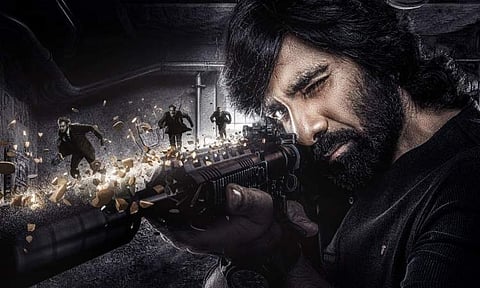Eagle Movie Review: A competent action entertainer salvaged by a strong second-half
Rating:(3 / 5)
For purposes of classification and clarity, I will take the liberty of dividing contemporary action films into two categories. Action films in active voice and action films in passive voice. As the title suggests, action films in active voice cut straight to the chase, delivering its repertoire of thrills, bravura and standard-issue machismo from the get-go. Narrative formats notwithstanding, the active voice action cinema lands fast and thrives easy, with minimal build-up. There is also a tacit understanding of a protagonist’s motives in active voice action cinema. Then comes your passive voice action cinema, which has motivations more grandiose than the former category. Murmurs of worldbuilding and mythmaking enter the fray. Comparatively little footage of the actual protagonist is displayed. What we do get is extensive ‘elevations’, delivered by a motley group of characters associated with the protagonist. We are introduced to the protagonist as a thriving figment of these characters’ narratives, raising the hero to levels of myth. Think of the Mohanlal starrer Lucifer (2019), where the hero enters the film an hour into the runtime. Or KGF, where Rocky Bhai is a tale narrated by Anant Nag and later, Prakash Raj. Ravi Teja himself had a go at this passive voice format with Tiger Nageswara Rao to underwhelming results. Passive voice is the flavour of the season for more reasons than one. For starters, it lends itself well to the franchising bandwagon. Create a story and you have a film. But build a myth, and you have a franchise. The passive voice format also works with ageing actors, with a filmmaker being able to extract maximum myth with minimum screen time. While it is unfair on some level to bring comparisons, it is hard to not think of Eagle without it. For whatever merits the film later goes on to earn, it comfortably rests on the passive voice action cinema format — lock, stock and barrel.
Director - Karthik Gattamaneni
Cast - Ravi Teja, Anupama Parameswaran, Srinivas Avasarala, Navdeep, Madhoo, Kavya Thapar, Vinay Rai
When Delhi-based journalist Nalini Rao (Anupama Parameswaran) is fired from her job on account of publishing a story that lands her employers in a soup, she heads off to Talakona in Andhra Pradesh in search of a story, bigger than she had first assumed. A goose chase in theory is turned into a convenient plot device, where we meet a host of carefully curated supporting characters delivering bits and pieces of a story. The unusual suspects here include a lapsed communist (Praneeta Pattnaik), a suave sidekick (Navdeep), a wry intelligence agent (Srinivas Avasarala), and another intelligence agent (Think M from James Bond films) draped in crisp, tailored sarees (Madhoo). Ajay Ghosh, who seems to play a slimy character in every other Telugu film also joins the party, as — you guessed it right — a slimy politician. An otherwise straightforward story earns its gravitas through the presence of these notable faces. These characters, for the large part, may just be two-word prompts, but a strong focus on casting renders them more memorable than what they otherwise would have been. After we get a bunch of parallel subplots masquerading as a first half, the latter parts of the film manage to capture one’s attention and make the film worth its while. Think of the old Buddhist parable that has an elephant described in six different ways by six blind men? Eagle internalises this story in spirit. Through the fractured narratives told to Nalini by those antagonised by Sahadeva, we get our blind men. The elephant in the room, ahem, the Eagle in the room, finds its footing when we learn of its titular protagonist’s backstory. Much like the mighty bird he is named after, Ravi Teja’s Eagle is seen hovering from a distance, with an unflinching aim towards a target. This brings us to some of the film’s more interesting turns, be it with his romance with Rachana (Kavya Thapar) or why his life turns from unchecked violence to vigilantism inspired by nuclear deterrence. While many a new-age action film derives its inspiration from video games or/and comic books, Eagle goes the extra (less abstract) mile, having blocks designed like comic book chapters and PUBG games. The film also shines when it delivers its rather persuasive message. Can a good man be entirely divorced from his dark side? How much of stopping the bad also means internalising the bad? How much of purpose is derived from pain and sacrifice? Eagle has some good answers for these questions. Davzand’s background score also helps Eagle to a great extent, conjuring crescendo after crescendo to bolster a story that takes its own sweet time to take off. For a film that shines fairly well as a screenplay, its sing-song, overly dramatic dialogues stick out like an old-school thumb. After a satisfying penultimate scene involving a massive idol, Eagle lays some groundwork for its sequel. While one cannot entirely be sure of a part two’s prospects, there is a glimmer of hope, provided Karthik Gattamneni & co continue to provide a combination of competent filmmaking and neat narrative manoeuvres.

